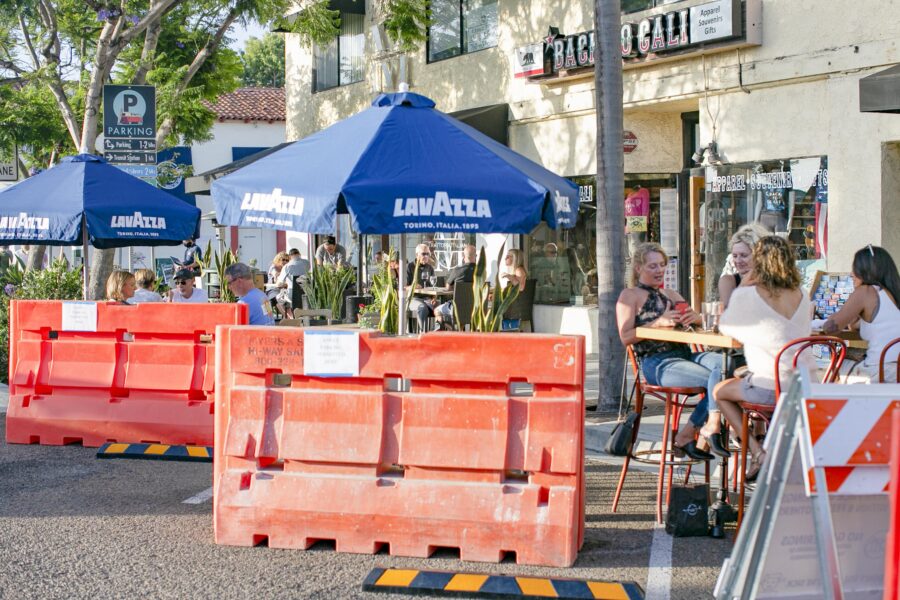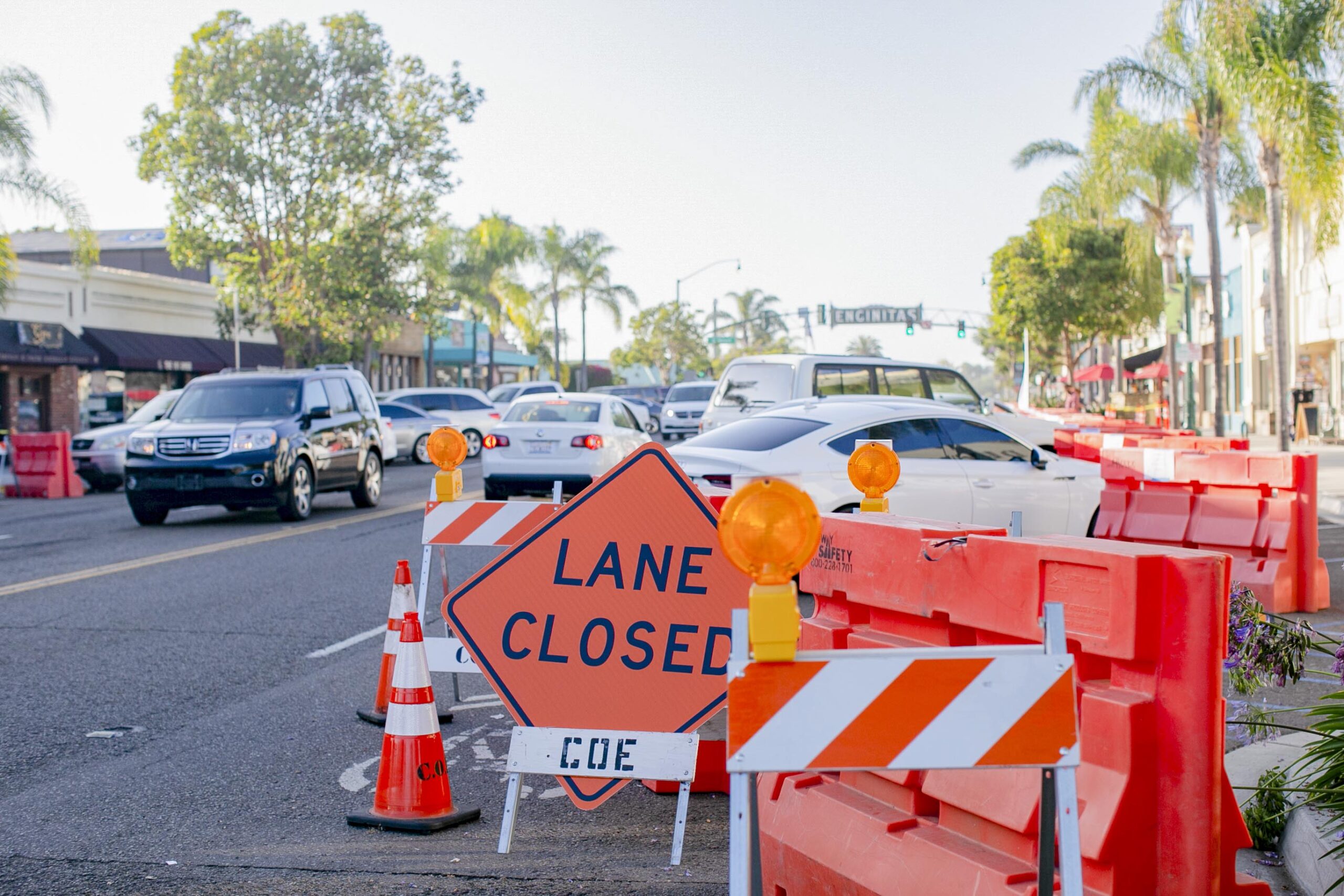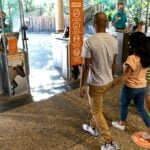ENCINITAS — Following the closure of indoor dining at restaurants, bars, and wineries on July 6, the City of Encinitas’ chose a pivotal time to implement its “Shared Streets” pilot program, as downtown restaurants and businesses struggle to make ends meet after five months of mandatory health restrictions.
Located between D and E street on Highway 101, the “Shared Streets” pilot program, which started on July 3 and has no scheduled end date, restricts traffic to two lanes, allowing for businesses and restaurants to set up curb-side dining and shopping without removing any public parking spaces.
Partially funded by an $8,200 SANDAG grant and supplemented by the city, the exploratory program will be in place for the duration of the county’s “safer-at-home” public health order. If deemed successful, the program could be expanded to other streets in downtown Encinitas.
Assistant City Manager Mark Delin spoke to the Coast News about the program.

“We’re doing this to help the business community and restaurants operate as close to their original capacity as possible,” Delin said. “The purpose is to give them additional space to operate.”
The project was spearheaded by Crystal Najera, Encinitas’ Climate Action Plan program administrator, and City Planner Roy Sapa’u, in consultation with Encinitas 101 Mainstreet Association.
“Shared Streets” dining and shopping spaces will be blocked out by water filled barriers, signage, and in the coming weeks, lined with large potted trees, which will be purchased by the city to protect customers from traffic and to create a pleasant dining experience.
According to Delin, after the program is over, the trees will be replanted in northwest Leucadia as a part of the upcoming Streetscape renovations to Coast Highway 101.
“We’ve long been in discussions with the Encinitas 101 about finding ways to enliven the downtown area and make it more pedestrian and customer focused,” Delin said. “This could also be thought of a pilot program of what downtown could look like if we permanently provided these amenities to businesses.”
However, thus far “shared streets” has not been an immediate success. The slow rollout over the holiday weekend was met with mixed reviews from residents and business owners as stand-still traffic backed up to intersection of Hwy 101 and Encinitas Blvd.
In an effort to ease congestion and promote smooth flow of traffic, all southbound traffic has been restricted from turning left, yet local business owners doubt whether that will solve the problem.
Debbie Zinniger, co-owner of Encinitas Café, supports the program and the city’s intent to help businesses however fears increased traffic will cause a further lull in business.
“We were really, really slow over the 4th of July weekend, the first weekend they reduced traffic to one lane. Merchants were disappointed,” Zinniger said.
Despite running the Encinitas Café for over 31 years, Zinniger has never before experienced the level of financial hardships wraught by COVID. After closing for nine weeks this spring, she intends to push through the county’s most recent round of closures, hoping for the best.
“With ‘Shared Streets,’ I should be able to get about three or four more tables out there,” Zinniger said. “We’re going to try it but if that doesn’t work then I may be forced to close my doors permanently. How much money can you lose? How deep do you go?
“I always said if there was a second shut down, I probably wouldn’t make it but we’re going to try,” Zinniger said.
The Roxy, owned by Paula Vrakas, is among the first restaurants to submit their permit, setting out tables for customers within days of the program’s rollout.
While the first weekend was slow, by the middle of the next week all of the Roxy’s “shared streets” tables were filled with customers.
Despite moderate success within the first few days, Vrakas doubted the program would be truly successful unless the Encinitas City Council allows alcohol to be served in the right of way.
“Nobody wants to go out to dinner and not have a cocktail or wine,” Vrakas said. “If you can sit out front and enjoy a drink with your meal, I think it’ll be successful. It could be really good for businesses and downtown area.”
When asked about extending liquor permits to the right of way, Delin said “it’s possible that the City Council may consider this. [Such a decision] would be a balance between the interests of businesses and the interests of adjacent residential communities.”
The city’s program comes at a time when Southern California is facing a spike in COVID-19 cases and the looming prospect of a second round of extended business closures.
Even businesses located on Hwy 101 in the heart of downtown face the real possibility of permanently closing their doors.
“Shared Streets” might be the solution to keep businesses running.
Over the holiday weekend, Encinitas Marine Safety Captain Larry Giles estimated around 40,000 people packed local beaches, more than in previous years.
Lifeguards, as well as Encinitas’ City Manager Jennifer Campbell and Deputy Mayor Kelli Hinze handed out an estimated 4,000 masks to beachgoers this weekend.
“People were pretty appreciative of the masks and the most part there were a lot of people down here wearing them. People are being a little more self-conscious about COVID and spacing themselves out now,” Giles said.




2 comments
The traffic is terrible. This shared streets isn’t new. SANDAG is pushing it.
Mixed reviews????? Ten out of ten businesses I spoke with about this specifically were in favor of it because it allows critical table space which means critical dollars flowing into their business to multiply through the local economy through these families. These dollars may make the critical difference between surviving and closing their doors.
Traffic is backed up every summer along all major corridors in Encinitas, including 101, btw.
The priority must be the continued existence and success of these local businesses. C-19 and its restrictions pose an existential threat.
Businesses south of 101 also want the program. Three in strong affirmation of three asked. Almost 600 people signed a petition in favor,of an extension of the program south, to their businesses, so they can SURVIVE. 24 hours/600 signed on.
What is this “mixed reviews” narrative, first with a wildly successful and popular Rail Trail now used by hundreds and thousands of families with seniors and tots and pets, and now this?
Groundwork clearly not done. These businesses need money to survive, and table space is money. And the city might consider waiving the application fee for these businesses. Too onorous on top of everything else.
Walk or ride around town. Get out of your car, for God’s sake. Spend money locally, everyone! Help out! Get them through this!
Comments are closed.